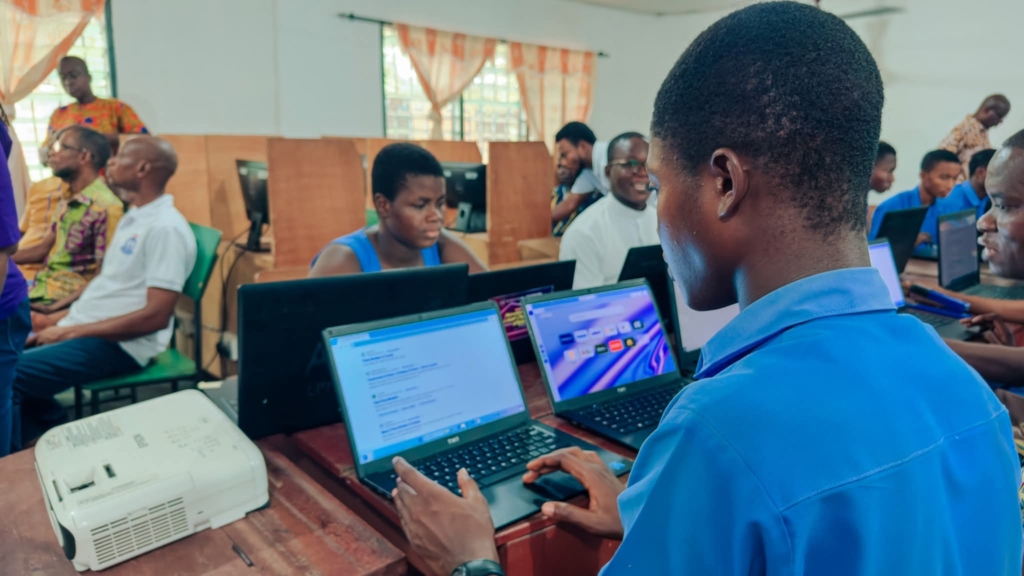
A student of Tanyigbe SHS using the school’s computer lab after the restoration of the internet
Tanyigbe Senior High School, established in January 1991 during Ghana’s education reforms under the Provisional National Defence Council (PNDC), has long battled systemic challenges common to rural schools.
According to the headmaster of the school, Mr. Etse Godstime Seake-Kwawu Tanyigbe, among these, limited infrastructure, insufficient teaching materials, and the absence of stable internet access have severely affected both teaching and learning.
For the past two years, the school’s computer laboratory was essentially offline, forcing students and teachers to rely on expensive and unreliable mobile data for all digital-related academic activities. This situation created a serious gap in modern learning, especially under the new educational curriculum that places strong emphasis on research and practical ICT work.
With a student population of 666, supported by 59 teaching and 28 non-teaching staff, Tanyigbe SHS was established through the vision of the community’s traditional leaders. The school was founded under the Free, Compulsory, Universal Basic Education (FCUBE) policy to provide local children with access to secondary education without having to travel long distances.
After enduring more than two years without a stable internet, the school’s fortunes changed with the intervention of Friends of Adaklu (FOA) and Our Future Prize, two organisations committed to educational transformation. In collaboration, they installed a Starlink satellite internet device on the school premises.
According to Madam Stella Kudah, Country Director of FOA, the installation comes with a free data subscription that will enable students and teachers to explore the internet without limits for the next year, marking a significant milestone and a potential turning point in the academic journey of the students and teachers.
Mr. Botchway Bright Bernard, Head of IT at Tanyigbe SHS, recounted the difficult period when the school had no internet access. “We depended on mobile data and personal hotspots to access the internet, which cost us about GHC 1,500 a month. Even then, it wasn’t reliable and would get exhausted quickly. It limited access and didn’t support practical teaching of computing and other tech-based subjects,” he explained.
The new syllabus being implemented at the senior high school level heavily relies on digital tools and online resources, especially for elective ICT and science-related subjects. Mr. Bernard expressed optimism that the Starlink installation will enable more interactive and comprehensive learning. “Now, any teacher can come in and use the lab. We won’t need to restrict access anymore,” he said.
Despite the progress, the school still faces some challenges. Currently, only 20 computers are functional, which is grossly inadequate for the student population. “Monitoring becomes difficult in such overcrowded conditions,” Mr. Bernard noted, adding that the school will need at least 40 additional computers to set up a second lab in a space already identified within the new administrative block.
In an interview with Amankwah Xornam Susanna, the Head Girl of Tanyigbe SHS, “For the past two years, elective IT students struggled to complete their assignments because the lab wasn’t functioning. But now, with the installation of the internet, we can access resources and research new syllabus content.” She emphasised how the lack of working computers and internet made it hard to understand subjects that weren’t clearly explained in textbooks.
The internet connectivity not only benefits IT students. The head girl believes students in other disciplines will also benefit from being able to research and access up-to-date academic content. “Some questions we’re given in class are not directly in the books, especially for first-year students. With internet access, we can now understand and solve these questions better,” she added.
The school’s leadership has long pursued a vision of transforming Tanyigbe SHS into a centre of excellence for preparing world-class students for national development. With a mission to provide secondary education through quality-driven leadership and core values of honesty, excellence, leadership, and development, the school now sees this installation as a critical step in achieving its goals.
The headmaster noted that he sees the internet installation as part of the broader global agenda to prepare students to be globally competitive, “We must expose them to the digital world,” he said.
The Starlink device offers high-speed internet and is known for its quick installation process. “I was surprised how fast and simple it was to set up,” said Mr. Bernard. With this installation, students now have the opportunity to explore online learning platforms, access academic journals, and engage in practical computing assignments in real-time.
The support of Friends of Adaklu and Our Future Prize comes at a critical moment when Ghana’s education system is undergoing reform to meet global standards. The partnership between civil society and educational institutions demonstrates how community-driven initiatives can bridge infrastructure gaps in rural schools.
As the school administration sets its sights on expanding its digital infrastructure, it is calling on government agencies, NGOs, and private sector stakeholders to support its efforts in acquiring more computers and creating a second computer lab. “We’re not there yet, but with the internet now in place, we have taken a very important step,” said Mr. Bernard.
For the students of Tanyigbe SHS, the installation of Starlink means more than just internet—it signals hope, access to opportunity, and a future aligned with global education standards.
DISCLAIMER: The Views, Comments, Opinions, Contributions and Statements made by Readers and Contributors on this platform do not necessarily represent the views or policy of Multimedia Group Limited.
DISCLAIMER: The Views, Comments, Opinions, Contributions and Statements made by Readers and Contributors on this platform do not necessarily represent the views or policy of Multimedia Group Limited.


